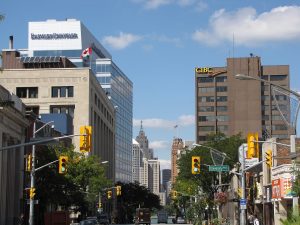As a landlord in Windsor, Ontario, understanding the Residential Tenancies Act (RTA) is crucial for compliant and successful property management. This article provides an overview of the RTA, highlighting key information for Windsor landlords in 2025.
The RTA is a provincial statute that governs the landlord-tenant relationship in Ontario and sets out the rights and responsibilities of both landlords and tenants. This article aims to provide an overview of the RTA and highlight what Windsor, Ontario landlords need to know in order to comply with the law.
Staying informed about these regulations is essential for navigating landlord-tenant relationships effectively, and a thorough knowledge will also make it easier to cope with difficult tenants.
Overview of the Residential Tenancies Act Ontario (RTA)
The RTA applies to most rental properties in Ontario, including apartments, houses, and condos. It sets out the rules for things such as rent increases, evictions, repairs, and maintenance, as well as the rights and responsibilities of landlords and tenants. The Act is designed to protect the rights of tenants while also providing landlords with a framework for managing their rental properties.
Key Provisions of the Ontario RTA
1. Tenancy Agreements
One of the key provisions of the RTA is the requirement for landlords to provide tenants with a written tenancy agreement. This agreement must include information such as the rent amount, payment due dates, and the length of the tenancy.
Landlords must also provide tenants with a copy of the RTA and a copy of the Ontario Standard Lease, which is a government-mandated lease agreement that must be used for most residential tenancies in the province. It’s crucial to use the most up-to-date version of the Standard Lease, as it can be updated periodically.
2. Rent Increases
In Ontario, landlords are required to follow specific rules regarding rent increases. These rules are designed to ensure that tenants are not subjected to unreasonable rent increases, while still allowing landlords to increase rents to cover their costs.
Under the RTA, landlords can only increase the rent once per year and must provide tenants with at least 90 days’ notice before the increase takes effect. Landlords should consult the latest guideline set by the Ontario government for 2025, which is 2.5% — the same increase as in 2024.
3. Eviction Process
Another important aspect of the RTA is the eviction process. In Ontario, landlords must have a valid reason to evict a tenant, such as non-payment of rent, illegal activities, or substantial interference with the landlord’s reasonable enjoyment of the property.
Landlords must follow a specific legal process, including providing written notice, applying to the landlord tenant board Windsor (or the LTB) for an eviction order, and, if necessary, enforcing the order through the court system.
Changes to eviction processes or timelines may occur, so staying updated as to when can a landlord evict a tenant in Ontario is essential.
4. Repairs and Maintenance
In addition to these requirements, the RTA also sets out specific rules for repairs and maintenance.
Landlords are responsible for ensuring that their rental properties are in good repair and meet all applicable health and safety standards. This includes repairing and maintaining things such as plumbing, heating, and electrical systems, as well as ensuring that the property is clean and free from pests.
Tenants are responsible for keeping the rental unit clean and for reporting any necessary repairs to the landlord in a timely manner. It’s useful to be aware of what repairs landlords are not responsible for in Ontario.
Local Bylaws and Regulations
As a landlord in Windsor, Ontario, it is also important to be aware of local bylaws and regulations that may apply to your rental property.
For example, the City of Windsor, Ontario has specific regulations related to a wide range of circumstances that must be followed by landlords, including fire safety and housing standards that must be followed by landlords.
There are also a series of Local Rules by Windsor-Essex which tie into the Housing Services Act and its related regulations.
Failure to comply with these regulations can result in fines and other penalties.
Security Deposits
In addition to these requirements, the RTA also sets out specific rules for the use of security deposits. In Ontario, landlords are allowed to collect a security deposit from tenants, but there are specific rules that must be followed:
The security deposit cannot be more than one month’s rent, and it must be returned to the tenant at the end of the tenancy, unless the landlord has a valid reason to retain it, such as damage to the rental property or unpaid rent.
Detailed documentation of the condition of the unit at the beginning and end of the tenancy is crucial for handling security deposit claims.
Compliance Tips for Windsor Landlords
Landlords should familiarize themselves with the RTA and the Ontario Standard Lease.
Maintain Truthful, Accurate Records
In order to ensure compliance with the RTA, landlords should keep accurate records of all rental transactions and communications with tenants. This includes copies of rental agreements, rent receipts, and any correspondence related to repairs, maintenance, or eviction.
It’s also a good idea to record any actions you take to deal with tenant complaints, or any tenant damage to property — asking the right tenant screening questions can help to avoid the latter.
Resolving Disputes & Contacting the LTB
If you encounter a disagreement with your tenant, the first step should always be open communication to try and reach a resolution. However, if a solution remains elusive, the Landlord and Tenant Board (LTB) is the official body responsible for resolving disputes arising under the RTA. They offer mediation services and can adjudicate on various issues between landlords and tenants.
For more information on the RTA and your rights and responsibilities as a landlord, you can access the official Ontario government source for the Act here: The Residential Tenancies Act (RTA).
If you’d prefer to speak with someone directly, the Landlord and Tenant Board at 1-888-332-3234 or visit TribunalsOntario.ca/ltb.
By understanding and adhering to the RTA and local regulations, you can manage your Windsor rental property effectively and build a positive relationship with your tenants.
Employ A Property Management Company
The best way to ensure compliance and reduce your workload is to hire a professional — it’s their job to know the best ways to stay compliant and avoid issues.
Property management companies come with many advantages. They specialize in handling the day-to-day tasks associated with rental properties, freeing you up to focus on other priorities.
Resources
- Ontario Residential Tenancies Act (RTA)
- Ontario Residential Rent Increase Guidelines
- City of Windsor Homepage
By staying informed about the RTA and local regulations, Windsor landlords can effectively manage their properties and foster positive relationships with their tenants. This information is for general guidance only and does not constitute legal advice. Consulting with a legal professional is recommended for specific situations.





